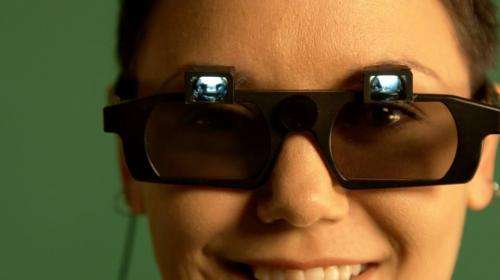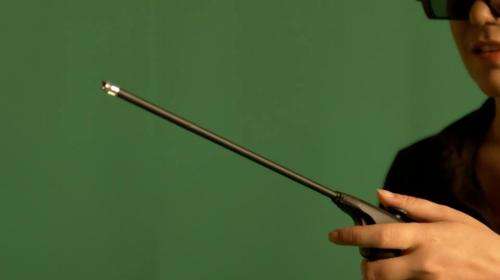(Phys.org) —Hardware and software designers Jeri Ellsworth and Rick Johnson have designed what they call a projected augmented reality system—called the castAR, it appears to be unlike anything else being sold today. It' a special pair of glasses, an infrared embedded surface and a magic wand—it allows for looking at and making changes to what looks to the user, like a holographic image. After a lot of design, testing and building, they've come up with a prototype that serves as the basis for a new Kickstarter project.
The eyeglasses have very tiny projectors placed above each eye that project an animated image onto a special mat. A sensor just above the nose lets the system know where the person is looking and sensors in the mat keep track of where things are that are placed or moved by the person running the system. To visualize the system, imagine placing a plastic mat on the table in front of you—when you look down at it, you see a three-dimensional animated world dropping down "into" the table. To control what happens in that virtual world, you use your wand, like a mouse with a desktop computer. More impressive is that more than one person can don glasses and use the same mat at the same time—it can be shared by two people sitting across from one another—each with their own private view of the virtual world—quite naturally leading to gaming. To demonstrate, Ellsworth and Johnson set up a three dimensional version of dungeons and dragons. Adding to the surreal experience is that when players move their heads, they get a different perspective of the projected imagery, just as if they were watching something real happening on their kitchen table. It's a truly impressive system—one that will very likely be made for sale to the public relatively soon as interest in the Kickstarter project has been pushing the dollar amount needed very quickly towards the goal of $400,000.
The system also comes with an optional attachment for the glasses that blot out the real world allowing for a fully immersive 3D augmented reality system. Also, additional mats can be added to the system, increasing the physical size of the virtual world. Ellsworth and Johnson suggest that given the right resources, the mats could conceivably cover the floor, walls, and ceiling in a room, creating a holodeck.
More information:
technicalillusions.com/
www.kickstarter.com/projects/t … ile-ar-and-vr-system
© 2013 Phys.org

























